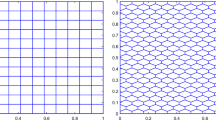Abstract
In this paper, we construct the Arrow–Hurwicz iterative finite element method for solving the stationary thermally coupled incompressible magnetohydrodynamics system, where a decoupled discrete system is obtained and no saddle point problem is required to deal with at each iterative step. Under several conditions, it is proved that the iterative solution solved by the proposed iterative method is convergent. Finally, the effectiveness of the considered iterative method is illustrated with some numerical examples.


Similar content being viewed by others
Data Availability
Not applicable.
References
Arrow, K., Hurwicz, L., Uzawa, H.: Studies in Nonlinear Programming. Standford University Press, Standford (1958)
Badia, S., Hernández, N.: Approximation of the thermally coupled MHD problem using a stabilized finite element method. J. Comput. Phys. 230, 1281–1303 (2011)
Badia, S., Martína, A.F., Planas, R.: Block recursive LU preconditioners for the thermally coupled incompressible inductionless MHD problem. J. Comput. Phys. 274, 562–591 (2014)
Bermúdez, A., Muñoz-Sola, R., Vázquez, R.: Analysis of two stationary magnetohydrodynamics systems of equations including Joule heating. J. Math. Anal. Appl. 368, 444–468 (2010)
Boland, J., Layton, W.: Error analysis for finite element methods for steady natural convection problems. Numer. Funct. Anal. Optimiz. 11, 449–483 (1990)
Bramble, J.H., Pasciak, J.E., Vassilev, A.T.: Analysis of the inexact Uzawa algorithm for saddle point problem. SIAM J. Numer. Anal. 34, 1072–1092 (1997)
Chen, P., Huang, J.: On the geometric convergence of the Arrow-Hurwicz algorithm for steady incompressible Navier-Stokes equations. J. Comput. Anal. Appl. 18, 628–635 (2015)
Chen, P., Huang, J., Sheng, H.: Some Uzawa methods for steady incompressible Navier-Stokes equations discretized by mixed element methods. J. Comput. Appl. Math. 273, 313–325 (2015)
Chen, P., Huang, J., Sheng, H.: Solving steady incompressible Navier-Stokes equations by the Arrow-Hurwicz method. J. Comput. Appl. Math. 311, 100–114 (2017)
Degond, P., Ferreira, M.A., Motsch, S.: Damped Arrow-Hurwicz algorithm for sphere packing. J. Comput. Phys. 332, 47–65 (2017)
Ding, Q.Q., Long, X.N., Mao, S.P.: Convergence analysis of Crank-Nicolson extrapolated fully discrete scheme for thermally coupled incompressible magnetohydrodynamic system. Appl. Numer. Math. 157, 522–543 (2020)
Dong, X.J., He, Y.N.: Convergence of some finite element iterative methods related to different Reynolds numbers for the 2D/3D stationary incompressible magnetohydrodynamics. Sci. China Math. 59, 589–608 (2016)
Du, B.B., Huang, J.G.: The generalized Arrow-Hurwicz method with applications to fluid computation, Commun. Comput. Phys. 25, 752–780 (2019)
Du, B.B., Huang, J.G., Zheng, H.B.: Two-Grid Arrow-Hurwicz methods for the steady incompressible Navier-Stokes equations. J. Sci. Comput. 89, 24 (2021)
Gerbeau, J.F., Le Bris, C., Lelièvre, T.: Mathematical Methods for the Magnetohydrodynamics of Liquid Metals. Oxford University Press, Oxford (2006)
Girault, V., Raviart, P.A.: Finite Element Method for Navier-Stokes Equations: Theory and Algorithms. Springer-Verlag, New York (1986)
Gunzburger, M.D., Meir, A.J., Peterson, J.S.: On the existence, uniqueness, and finite element approximation of solutions of the equations of stationary, incompressible magnetohydrodynamics. Math. Comp. 56, 523–563 (1991)
He, Y.N., Li, J.: Convergence of three iterative methods based on the finite element discretization for the stationary Navier-Stokes equations. Comput. Methods Appl. Mech. Engrg. 198, 1351–1359 (2009)
Huang, P.Z., He, Y.N.: A Uzawa-type algorithm for the coupled Stokes equations. Appl. Math. Mech. 41, 1095–1104 (2020)
Huang, P.Z.: Convergence of the Uzawa method for the Stokes equations with damping. Complex Var. Elliptic Equ. 62, 876–886 (2017)
Li, X., Huang, P.: An Uzawa iterative method for the natural convection problem based on mixed finite element method. Math. Methods Appl. Sci. 44, 13326–13343 (2021)
Meir, A.J.: Thermally coupled magnetohydynamics flow. Appl. Math. Comput. 65, 79–94 (1994)
Meir, A.J.: Thermally coupled, stationary, incompressible MHD flow; existence uniqueness, and finite element approximation. Numer. Meth. Part. Differ. Equs. 11, 311–337 (1995)
Meir, A.J., Schmidt, P.G.: On electronmagnetically and thermally driven liquid-metal flows. Nonliear Anal. 47, 3281–3294 (2001)
Nochetto, R.H., Pyo, J.H.: Optimal relaxation parameter for the Uzawa method. Numer. Math. 98, 695–702 (2004)
Olshanskii, M.A.: An iterative solver for the Oseen problem and numerical solution of incompressible Navier-Stokes equations. Numer. Linear Algebra Appl. 6, 353–378 (1999)
Queck, W.: The convergence factor of preconditioned algorithms of the Arrow-Hurwicz algorithms. SIAM J. Numer. Anal. 26, 1016–1030 (1989)
Ravindran, S.S.: A decoupled Crank-Nicolson time-stepping scheme for thermaly coupled magneto-hydrodynamic system. Int. J. Optimiz. Control Theories Appl. 8, 2146–5703 (2018)
Ravindran, S.S.: Partitioned time-stepping scheme for an MHD system with temperature-dependent coefficients. IMA J. Numer. Anal. 39, 1860–1887 (2019)
Temam, R.: Navier-Stokes Equations. North Holland, Amsterdam (1979)
Xu, H., He, Y.N.: Some iterative finite element methods for steady Navier-Stokes equations with different viscosities. J. Comput. Phys. 232, 136–152 (2013)
Yang, Y.B., Jiang, Y.L., Kong, Q.X.: The Arrow-Hurwicz iterative finite element method for the stationary magnetohydrodynamics flow. Appl. Math. Comput. 356, 347–361 (2019)
Yang, J.T., Zhang, T.: Stability and convergence of iterative finite element methods for the thermally coupled incompressible MHD flow. Int. J. Numer. Methods Heat fluid flow 30, 5103–5141 (2020)
Acknowledgements
The authors would like to thank the editor and anonymous reviewers for their helpful comments and suggestions which lead to a considerably improved presentation.
Funding
This work is sponsored by Natural Science Foundation of Xinjiang Uygur Autonomous Region (Grant Number 2021D01E11).
Author information
Authors and Affiliations
Corresponding author
Ethics declarations
Conflict of interest
The authors declare that they have no conflict of interest.
Additional information
Publisher's Note
Springer Nature remains neutral with regard to jurisdictional claims in published maps and institutional affiliations.
This work is sponsored by Natural Science Foundation of Xinjiang Uygur Autonomous Region (Grant Number 2021D01E11)
Rights and permissions
About this article
Cite this article
Keram, A., Huang, P. The Arrow–Hurwicz Iterative Finite Element Method for the Stationary Thermally Coupled Incompressible Magnetohydrodynamics Flow. J Sci Comput 92, 11 (2022). https://doi.org/10.1007/s10915-022-01867-y
Received:
Revised:
Accepted:
Published:
DOI: https://doi.org/10.1007/s10915-022-01867-y




